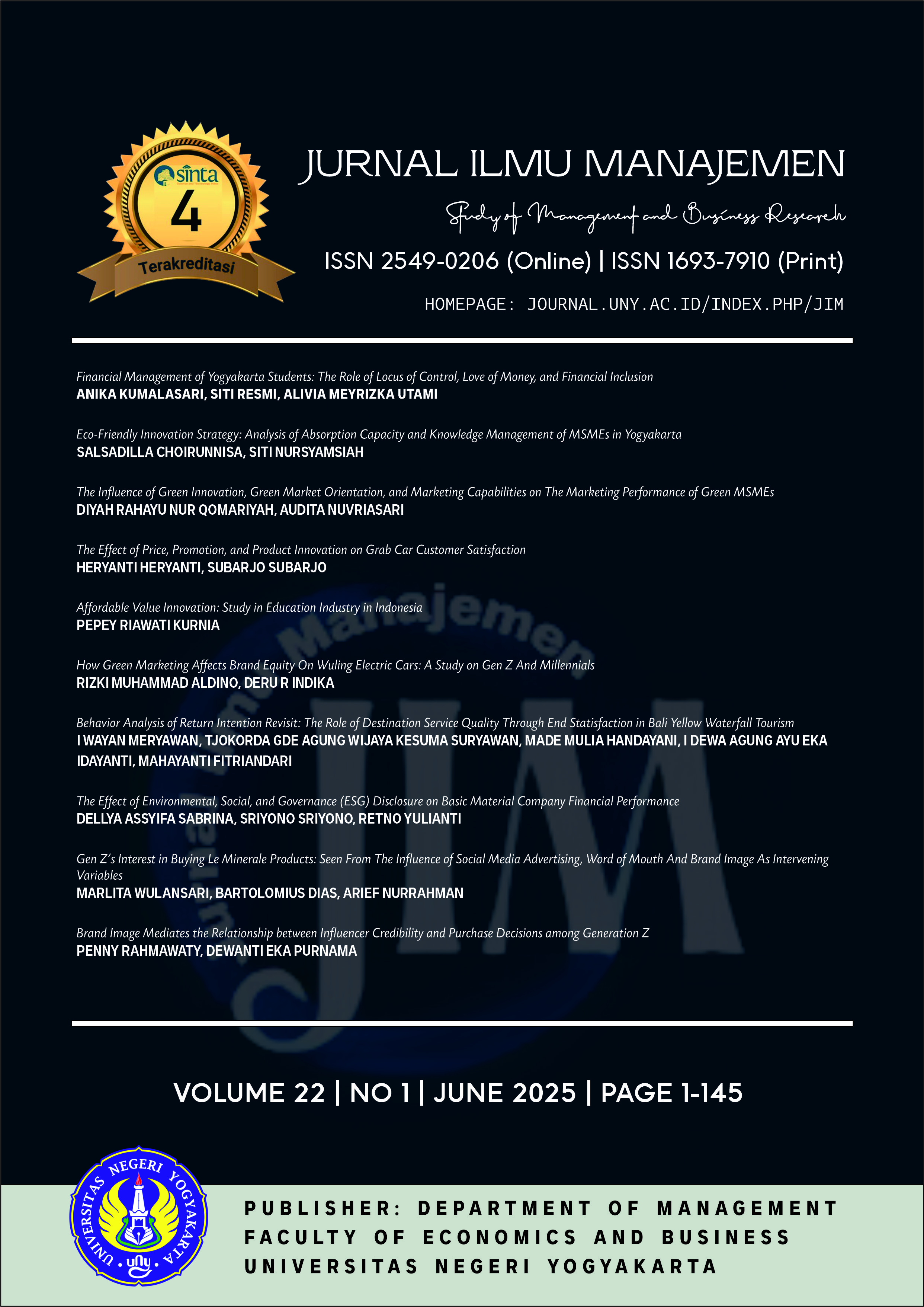Financial Management of Yogyakarta Students: The Role of Locus of Control, Love of Money, and Financial Inclusion
DOI:
https://doi.org/10.21831/jim.v22i1.81434Keywords:
Locus of Control, Love of Money, Financial Inclusion, Financial ManagementAbstract
Financial behavior has always been an interesting topic, especially student financial management. This study examines the role of locus of control, love of money, and financial inclusion variables on financial management carried out by students in Yogyakarta. Data were collected from online questionnaires completed by 120 respondents who met the research criteria. The multiple linear regression analysis results showed that Love of Money and Financial Inclusion positively affected financial management. This shows that Yogyakarta students have an interest in money, and easy access to financial services makes their financial management better. However, Locus of Control did not show a significant effect on financial management. These results indicate that confidence in the results obtained, depending on individual behavior, has not affected students' financial management in Yogyakarta. This study only involved students from several universities in Yogyakarta, so it is impossible to generalize to all students in Yogyakarta. Furthermore, the characteristics of students who are respondents to the study, such as majors, year of enrollment, socio-economic background, and others, can also affect the results of the study. Therefore, this study is expected to add new insights to research related to management behavior.
References
Akmalia, N. A. (2020). Pengaruh Locus of Control (Lokus Kendali), Self Efficacy (Efikasi Diri) dan Lingkungan Kerja terhadap Kinerja Karyawan di Bank Syariah Mandiri Wilayah Bogor [Universitas Islam Negeri Syarif Hidayatullah]. In Global Health (Vol. 167, Issue 1). https://www.e-ir.info/2018/01/14/securitisation-theory-an-introduction/
Astuti, M. D., & Soleha, E. (2023). Pengaruh Literasi Keuangan, Financial inclusion dan Locus of Control terhadap Financial management. Jurnal Ekonomi Pendidikan Dan Kewirausahaan, 11(1), 51–64. https://doi.org/10.26740/jepk.v11n1.p51-64
Brigham, E. F., & Houston, J. F. (2007). Fundamentals of Financial Management Eleventh Edition (11th ed.). Lachina Publishing Service, Inc.
Copur, Z., & Gutter, M. S. (2019). Economic , Sociological , and Psychological Factors of the Saving Behavior"¯: Turkey Case. Journal of Family and Economic Issues, 0(0), 0. https://doi.org/10.1007/s10834-018-09606-y
Diana, A. R., & Aisyah, M. N. (2018). Pengaruh Pengetahuan Etika, Religiusitas dan Love of Money terhadap Persepsi Etis Mahasiswa Akuntansi. Jurnal Profita: Kajian Ilmu Akuntansi.
Ghozali, I. (2021). Aplikasi Analisis Multivariate dengan Program IBM SPSS 26 (10th ed.). Semarang: Badan Penerbit Universitas Diponegoro.
Hair, J., Black, W., Babin, B., & Anderson, R. (2010). Multivariate Data Analysis (7th ed.). Pearson Prentice Hall.
Jennyya, V., Pratiknjo, M. H., & Rumampuk, S. (2021). Gaya Hidup Hedonisme di Kalangan Mahasiswa Universitas Sam Ratulangi. Jurnal Holistik, 14(3), 1–16. https://ejournal.unsrat.ac.id/index.php/holistik/article/view/34482/32374
Kinayung, D. (2022). Pengaruh Literasi Keuangan, Financial inclusion, Teman Sebaya dan Uang Saku terhadap Perilaku Menabung Mahasiswa Perguruan Tinggi Swasta di Yogyakarta. Skripsi. (Issue 8.5.2017).
https://dspace.uii.ac.id/handle/123456789/42848;jsessionid=AD2FB16A48627E2E3B01CB9D99FE0C21
Kurniawan, Asep, Fathurrahman, I., & Icih. (2020). Pengaruh Literasi Keuangan, Sikap Love of Money dan Pengetahuan Laporan Keuangan terhadap Perilaku Financial management UMKM di Wilayah Kab. Subang. JASS (Journal of Accounting for Sustainable Society), 2.
Kusumaningrum, S. M., Wiyono, G., & Maulida, A. (2023). Pengaruh Literasi Keuangan, Financial inclusion, dan Sikap Keuangan terhadap Financial management UMKM di Kapanewon Godean, Kabupaten Sleman. Jurnal Samudra Ekonomi Dan Bisnis, 14(2), 227–238. https://doi.org/10.33059/jseb.v14i2.6867
Larsen, R., & Buss, D. (2008). Personality Psychology-Domains of Knowledge about Human Nature (E. Barrosse (ed.); 3rd ed.). McGraw-Hill.
Lestari, A., & HS, S. (2022). The Effect of Financial Literacy , Financial Inclusion and Lifestyle on Financial Behavior in Millennial Generation. Jurnal Multidisiplin Madani, 2(5), 2415–2430.
Mahwan, I. B. P. F., & Herawati, N. T. (2021). Pengaruh Literasi Keuangan, Persepsi Risiko, dan Locus of Control terhadap Keputusan Investasi Pengusaha Muda di Singaraja. JIMAT (Jurnal Ilmiah Mahasiswa Akuntansi), 12(3), 768–780. https://repo.undiksha.ac.id/6498/
Novia, N. A., Berlianti, N., Anasril, A. R., & Rodiah, S. (2022). Pengaruh Pengetahuan Keuangan dan Locus of Control terhadap Perilaku Financial management Mahasiswa di Universitas Muhammadiyah Riau. Jurnal Ilmiah Ekonomi Terpadu (Jimetera), 2(1), 30–39. http://jurnal.utu.ac.id/jimetera
Nurhayati, H., & Nurodin, I. (2019). Pengaruh Keuangan Inklusi dan Literasi Keuangan terhadap Financial management Pribadi di Kabupaten Sukabumi. In Prosiding SEMNASTERA (Seminar Nasional Teknologi dan riset Terapan) (Vol. 1, Issue September).
https://semnastera.polteksmi.ac.id/index.php/semnastera/article/view/28
OJk. (2019). Pelaksanaan Kegiatan dalam Rangka Meningkatkan Financial inclusion di Sektor Jasa Keuangan. Journal of Chemical Information and Modeling, 15(2), 9–25.
Pradiningtyas, T. E., & Lukiastuti, F. (2019). Pengaruh Pengetahuan Keuangan dan Sikap Keuangan terhadap Locus of Control dan Perilaku Financial management Mahasiswa Ekonomi. Jurnal Minds: Manajemen Ide Dan Inspirasi, 6(1), 96. https://doi.org/10.24252/minds.v6i1.9274
Pusporini, P. (2020). Pengaruh Tingkat Literasi Keuangan terhadap Financial management pada Pelaku UMKM Kecamatan Cinere, Depok. Jurnal Ilmu Manajemen Terapan, 2(1), 58–69. https://doi.org/10.31933/jimt.v2i1.315
Raperlisda. (2017). Pengaruh Locus of Control dan Financial Knowledge terhadap Financial Management Behavior. Skripsi. Institut Informatika dan Bisnis Darmajaya. http://repo.darmajaya.ac.id/313/1/Raperlisda%201312110317.pdf
Reviandani, W. (2022). Pengaruh Locus of Control, Financial Knowledge dan Parental Income terhadap Perilaku Financial management (Studi pada Mahasiswa Baru Program Studi Manajemen Tahun 2021 Universitas Muhammadiyah Gresik). JMK (Jurnal Manajemen Dan Kewirausahaan), 7(2), 68–77.
Rifqi, M., Prasetyo, P., & Lestari, U. P. (2022). Pengaruh Literasi Keuangan , Love of Money dan Minat Investasi di Pasar Modal terhadap Manajemen Keuangan Pribadi ( Studi Kasus Mahasiswa Jurusan Akuntansi Politeknik Negeri Jakarta ). In Prosiding Seminar Nasional Akuntansi dan Manajemen (SNAM). https://prosiding-old.pnj.ac.id/index.php/snampnj/article/view/5556
Rotter, J. B. (1966). Generalized Expectancies for Internal Versus. Psychological Monographs, 80(1). https://doi.org/10.1037/h0092976
Rudy, Sunardi, N., & Kartono. (2020). Pengetahuan Keuangan dan Love of Money Pengaruhnya terhadap Financial management Pribadi dan Dampaknya terhadap Kesejahteraan Masyarakat Desa Cihambulu, Kec. Pabuaran Kab. Subang". Jurnal SEKURITAS (Saham, Ekonomi, Keuangan Dan Investasi), 4(1), 43–56.
Sarma, M., & Pais, J. (2019). Financial Inclusion and Development: A Cross Country Analysis. In Annual Conference of the Human Development and Capability Association, New Delhi, 168(10–13), 1–30. https://doi.org/10.1002/jid
Setyaningrum, N. (2020). Pengaruh Pengetahuan Keuangan, Love of Money, Perilaku Konsumtif terhadap Financial management Pribadi. Jurnal Respository UKSW.
Sugiyono. (2019). Metode Penelitian Kuantitatif Kualitatif dan R&D. Bandung: Alfabeta.
Tang, & Chiu, R. K. (2003). Income, Money Ethic, Pay Satisfaction, Commitment and Unethical Behavior"¯: Is the Love of Money the Root of Evil for Hong Kong Employees? Journal of Business Ethics, 13–30.
Ulfasari, H. (2018). Pengaruh Love of Money, Perilaku Machiavellian dan Jenis Kelamin terhadap Persepsi Etis Mahasiswa Akuntansi. Respository Muhammadiyah University of Ponorogo, Mi, 5–24.
Ulumudiniati, M., & Asandimitra, N. (2022). Pengaruh Financial Literacy, Financial Self-Efficacy, Locus of Control, Parental Income, Love of Money terhadap Financial Management Behavior"¯: Lifestyle sebagai Mediasi. Jurnal Ilmu Manajemen.
Wiyono, G. (2020). Merancang Penelitian Bisnis dengan alat analisis SPSS 25 & SmartPLS 3.2.8 (2nd ed.). Yogyakarta: UPP STIM YKPN.
Downloads
Published
How to Cite
Issue
Section
License
An author who publishes in the journal "Jurnal Ilmu Manajemen (JIM)" agrees to the following terms:
Author retains the copyright and grants the journal the right of first publication of the work simultaneously licensed under the Creative Commons Attribution-ShareAlike 4.0 License that allows others to share the work with an acknowledgement of the work's authorship and initial publication in this journal.
Author is able to enter into separate, additional contractual arrangements for the non-exclusive distribution of the journal's published version of the work (e.g., post it to an institutional repository or publish it in a book) with the acknowledgement of its initial publication in this journal.
Author is permitted and encouraged to post his/her work online (e.g., in institutional repositories or on their website) prior to and during the submission process, as it can lead to productive exchanges, as well as earlier and greater citation of the published work (See The Effect of Open Access).
All materials in this site are protected by the law. It is prohibited to quote a part of or all of this website contents for commercial purposes without the permission or consent of the editors.
If anyone finds one article or more in this journal violate or potentially violate one's copyrights, please report to us through e-mail of Principle Contact.
Legal-formal aspects of accessing any information and manuscript in this journal website refer to the provision of license Creative Commons Attribution-Share Alike (CC BY-SA). Read more about the Creative Commons Attribution-ShareAlike 4.0 Licence here: https://creativecommons.org/licenses/by-sa/4.0/.
All information available in 'Jurnal Ilmu Ekonomi (JIM)' is academic in nature. 'Jurnal Ilmu Ekonomi (JIM)' is not responsible for loss due to the abuse of information in the website.



.png)

